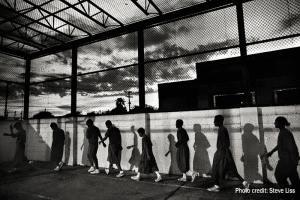A search to select a new superintendent for the Juvenile Temporary Detention Center (JTDC) will begin soon, The Chicago Daily Law Bulletin reports. After an ACLU lawsuit claiming substandard conditions and lack of services for youth detained in the facility, the county entered into an agreement in 2002 to monitor its improvement. Earl Dunlap was hired in 2007 to oversee the facility, but now as a result of a change in state law, Cook County Chief Circuit Judge Timothy C. Evans is tasked with finding his replacement.
Benjamin S.Wolf, the ACLU of Illinois’ associate legal director and lead counsel for the plaintiffs in the lawsuit against the county, said Dunlap remains in close contact with Evans’ office and is on the verge of completing his goals.
“He’s indicated he expects to complete the process bringing the facility up to constitutional standards within a few months,” Wolf said.
Read the article at The Chicago Daily Law Bulletin website (behind a pay wall).
Date
Monday, March 17, 2014 - 9:00amFeatured image


